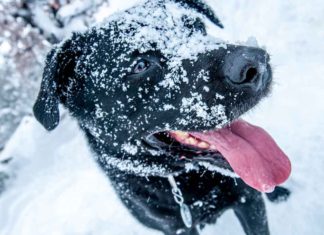Dogs may vomit for a number of reasons; some reasons are minor, but others are, in fact, cause for concern. It is important to know how to differentiate between the times when it is not absolutely necessary to consult a veterinarian and when it is vital to take immediate action.
Upset Stomach
Some dogs vomit simply because they ate something that they shouldn’t have that did not settle well and thus, just needs to come back up. Sometimes dogs will purposely eat grass in order to induce vomiting to settle an upset stomach. If they display no other strange symptoms and the vomiting is a one-time occurrence, then it is probably safe to say that the dog now feels better from relieving themselves in this manner.
Eating Too Rapidly or Not Fully Chewing Food
Dogs sometimes vomit, because they have scarfed their food down too quickly, which is another instance of when it typically is not necessary to consult a vet. This can often be remedied by hand-feeding a dog their food in smaller increments (a couple pieces at a time), allowing them to properly chew each piece as opposed to swallowing gulps of food entirely whole. There are also specially designed food bowls that slow down dogs that have a tendency to gobble their food, which are available at most pet retailers.
Change in Diet or Toxic Human Foods
A sudden change in diet may also cause a dog to vomit. A change in their dog food brand or the introduction of human foods that they are not used to or that are potentially toxic can bring on vomiting in dogs. Potentially life-threatening foods that should be avoided at all costs include grapes, raisins, onions, macadamia nuts, dairy products, and foods high in fat content such as bacon. If it cannot be determined what the dog has ingested that may have brought on the bouts of vomiting, it is wise to contact a vet.
A change in diet may also incite diarrhea in dogs. If the dog’s stool is soft or watery in consistency or is lighter or darker in color, it could be related to something they ate, but it is still smart to call a vet, especially if the dog is displaying any other behavior that is out of the ordinary, which could indicate that something else is going on.
Allergic Reaction to Insect Bite or Sting
Sometimes vomiting can be brought on by an allergic reaction to an insect bite or sting, which often requires medical treatment. Signs that a dog has been bitten or stung include facial swelling around the eyes, mouth, and ears (soft pink tissues) and possibly even the stomach or genitals, along with lethargy, general discomfort, itching, and vomiting.
Treatment often entails a steroid or antihistamine injection, administered by a vet or veterinary technician, to calm the reaction. Some vets will prescribe medication to take home or advise owners on proper dosing of human Benadryl. It is important to know safe dosing directions, because they are based on the dog’s body weight. A small breed dog weighing under 15lbs., for example, can be given one 25mg tablet of Benadryl or its generic equivalent, diphenhydramine hydrochloride, both of which are available over-the-counter at drugstores and mass retailers.
Contact a Veterinarian Immediately
If the vomiting persists and/or is accompanied by other symptoms, such as diarrhea, blood in the stool or vomit, excessive lethargy or a decrease in normal activity (i.e., disinterest in playing), panting, excessive thirst or an increase or decrease in appetite, it is a good idea to contact a vet, describe the symptoms in detail to them, and to seek further advice. They will then be able to advise on the proper course of action at that time. If these symptoms occur outside of normal veterinary office business hours, contact the nearest pet emergency clinic. Their rates will likely be higher (with payment required upfront), but it could be the difference of life and death in some cases.
More Serious Health Problems
Vomiting accompanied by diarrhea can be an indication of more serious health problems. Dogs are susceptible to their own form of the flu (only contracted among canines), and this can usually be treated with medication to stop the vomiting, by limiting their food and water intake for up to 12 hours, and then introducing them to a bland diet of boiled chicken breast and white rice in small amounts until they show signs that they are able to keep food down. After a couple days of eating and keeping down the bland chicken and rice diet, it is usually safe to return to their normal dog food diet.
Further Testing May Be Required
Vomiting and diarrhea may also be signs of intestinal inflammation (i.e., gas and bloating), intestinal blockage due to a foreign object lodged in the gastrointestinal tract, pancreatitis, or liver failure. Only a vet can properly diagnose which of these may be the underlying cause for the vomiting. Diagnosis often requires further testing beyond a physical exam such as blood work, X-rays, and ultrasounds. It can still be difficult for a veterinarian to be 100% sure of the problem, but they will be able to treat the symptoms to make the dog more comfortable. Surgery may be required if there is in fact a foreign body found in the intestinal tract.
Better Safe than Sorry
Dog vomiting and diarrhea may or may not be a serious indication of further health problems, but it is best to err on the side of caution when it comes to the life of a beloved pet. While some vomiting and diarrhea in dogs may be nothing to worry about, there are times that those behaviors indicate the need for further attention.
It is best not to ignore these warning signs, but rather to be proactive and seek the advice of a highly trained veterinarian. As our dog’s caretakers and “pack” we owe it to them to provide the very best love and care for them. Since they are unable to tell us in plain English how they are feeling, it is important to be aware of the signs and symptoms to look for that do tell us that something is out of the ordinary, as is the case with some bouts of dog vomiting and diarrhea.




























